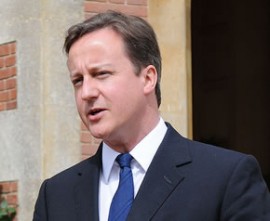
David Cameron (picture The Prime Minister’s Office)
Report on discussion at the Federal Union committee
The prime minister will give his long-awaited speech on his new Europe policy this coming Friday. In it, he will announce a plan for a referendum on Europe. All that remains unclear are the question, the timing, and consequences.
Most likely he will propose that there should be a renegotiation of the terms of British membership of the EU after the next election, followed by a referendum intended to confirm that renegotiation. If the alternative to the approval of renegotiation were to be British departure from the EU, then he will hope that this proposal will appeal to UKIP – which demands an In/Our referendum – and win back those people who are now its potential voters. The latest opinion poll shows Labour on 41 per cent, the Conservatives on 31 per cent and UKIP on 12 per cent, so the Tories need to get those UKIP voters back somehow.
This is a dangerous strategy. First of all, and most obviously, it puts Britain’s membership of the EU at risk. Even if the polls were favourable (and right now they are not) there is always the possibility that things could change adversely. Referendums, by definition, take things somewhat out of the hands of the political class.
The second risk is that the attempt at renegotiation fails. If no deal can be struck between the UK and the others, the government will be forced to recommend departure from the EU, something it has said it doesn’t want to do.
The third risk is that the deal is so meagre that the Tory right wing is unsatisfied and odemands leaving the EU anyway. That will give the government a difficult referendum and a thoroughly spilt Tory party.
These are enormous risks for a Tory leader committed to EU membership to run.
On the other side, if the prime minister does not commit to a referendum in the next parliament, he will be faced with uproar on his own backbenches. Many of his MPs want a referendum even sooner than that, and others have proposed that a referendum in the next parliament should be legislated for in this one as a means of reassuring people who do not trust Mr Cameron to keep his eurosceptic word. Dislike of the EU in the Conservative party has gone so far as to leave him with two awkward choices.
Dissenting voices on the committee suggested that the Tory party was not in fact as eurosceptic as all that, and that a modest renegotiation would suffice, once the prospect of leaving the EU altogether was clearly understood as the only alternative.
As to Labour, they showed no enthusiasm for a referendum on EU membership but might feel the need to match a Tory commitment to one when it came to the next general election. It was not yet apparent whether Labour would use Europe as a means of opposing the Tories or whether it would bend with the polls and adopt a more eurosceptic tone itself.